EFL teachers’ perceptions and practices regarding learner autonomy at Dong Thap University, Vietnam
Learner autonomy is currently one of the central themes in language education. Autonomous
learning plays an important role not only in university life but also throughout the life of learners. Exploring teachers’ perceptions and practices regarding learner autonomy (LA) is necessary, especially in the
local contexts, to provide more insights intothe field. The present study was conducted with 20 English-asa-foreign-language (EFL) teachers at Dong Thap University, Vietnam through interviews. The findings
showed that the teachers had positive understandingsof the related aspects and levels of learner autonomy. In practice, they made significant attempts to cultivate students’ autonomy. However, they faced certain common problems as shared by EFL teachers at other universities in Vietnam. On the basis of the findings a number of implications have been made.
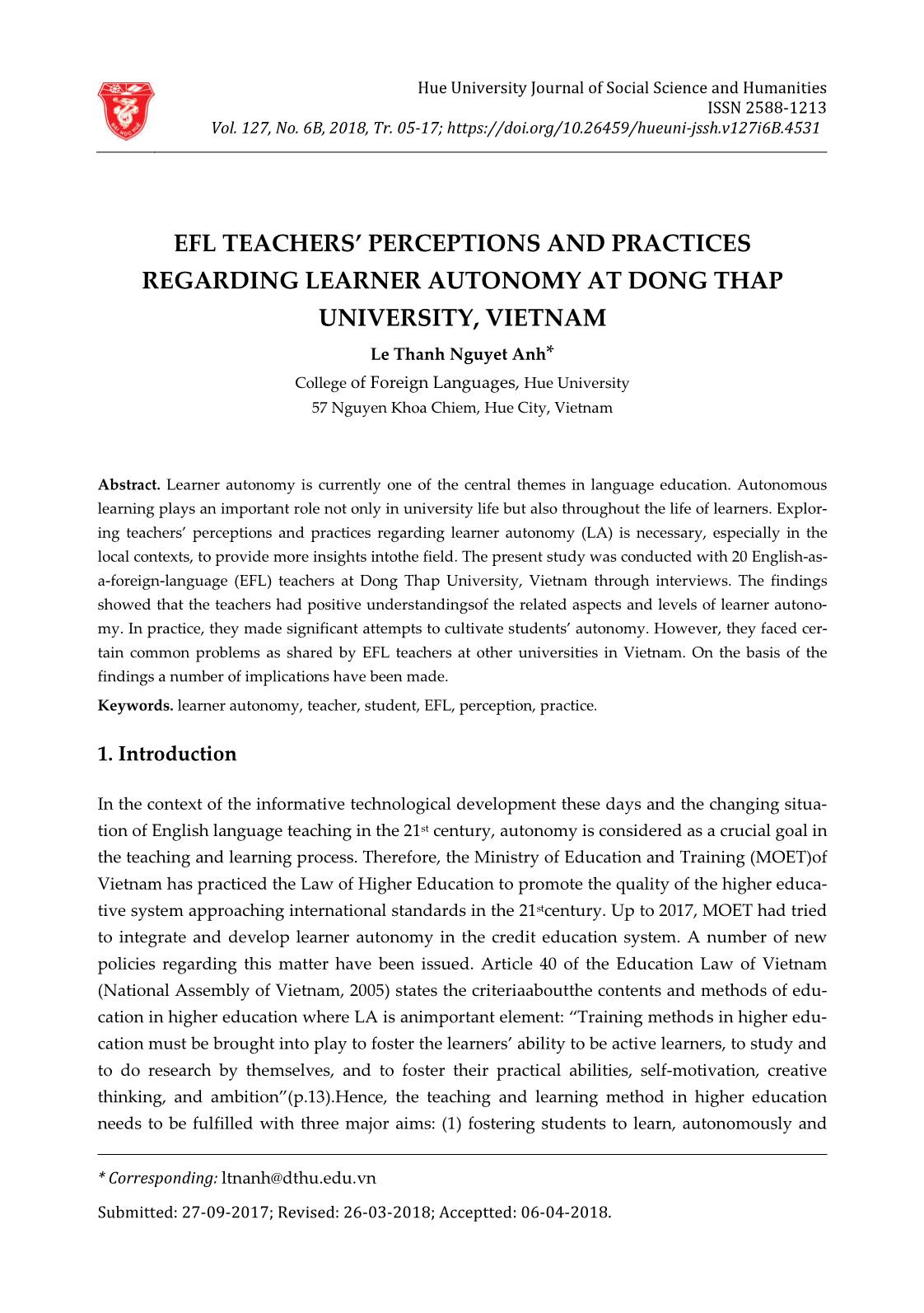
Trang 1
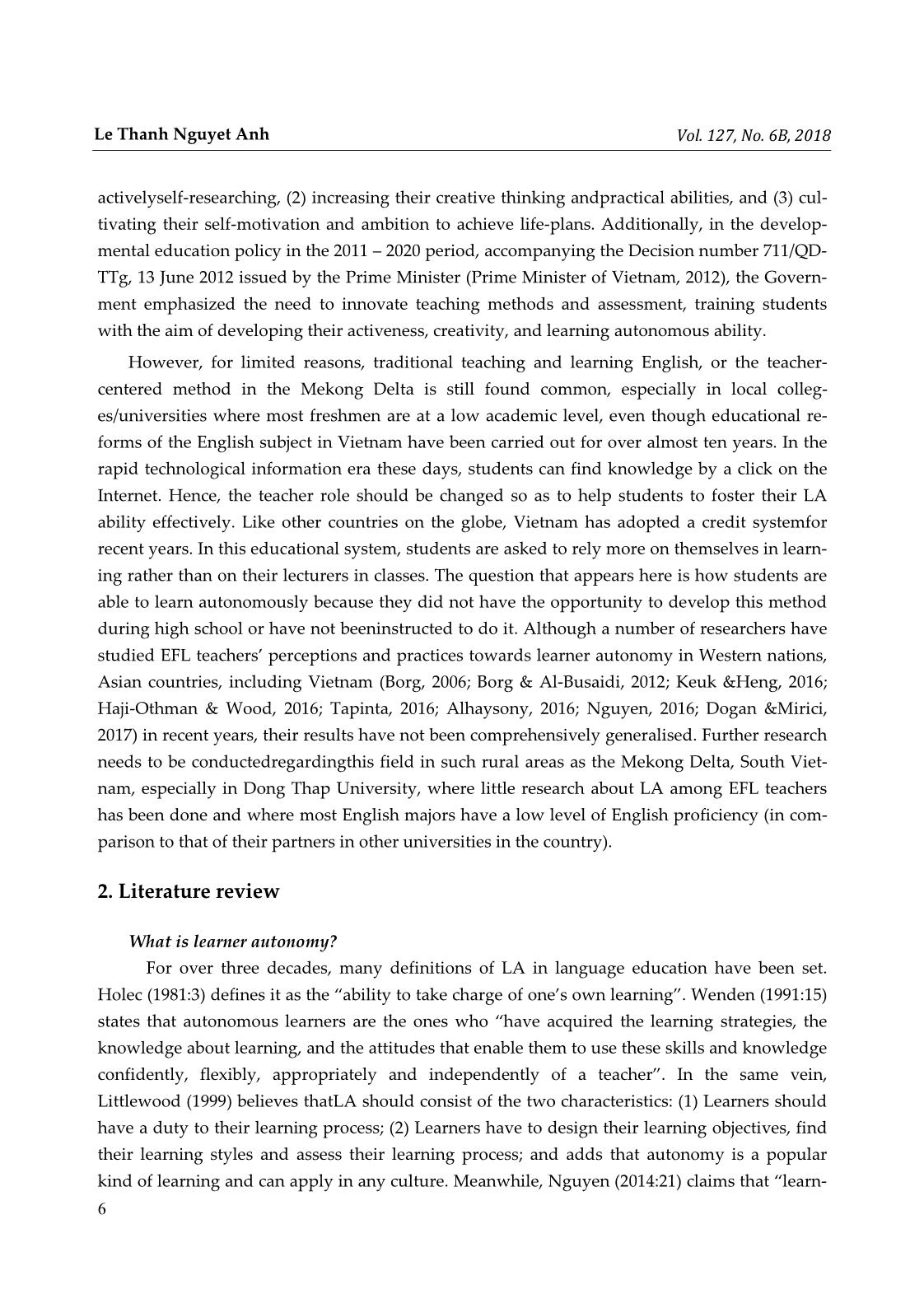
Trang 2
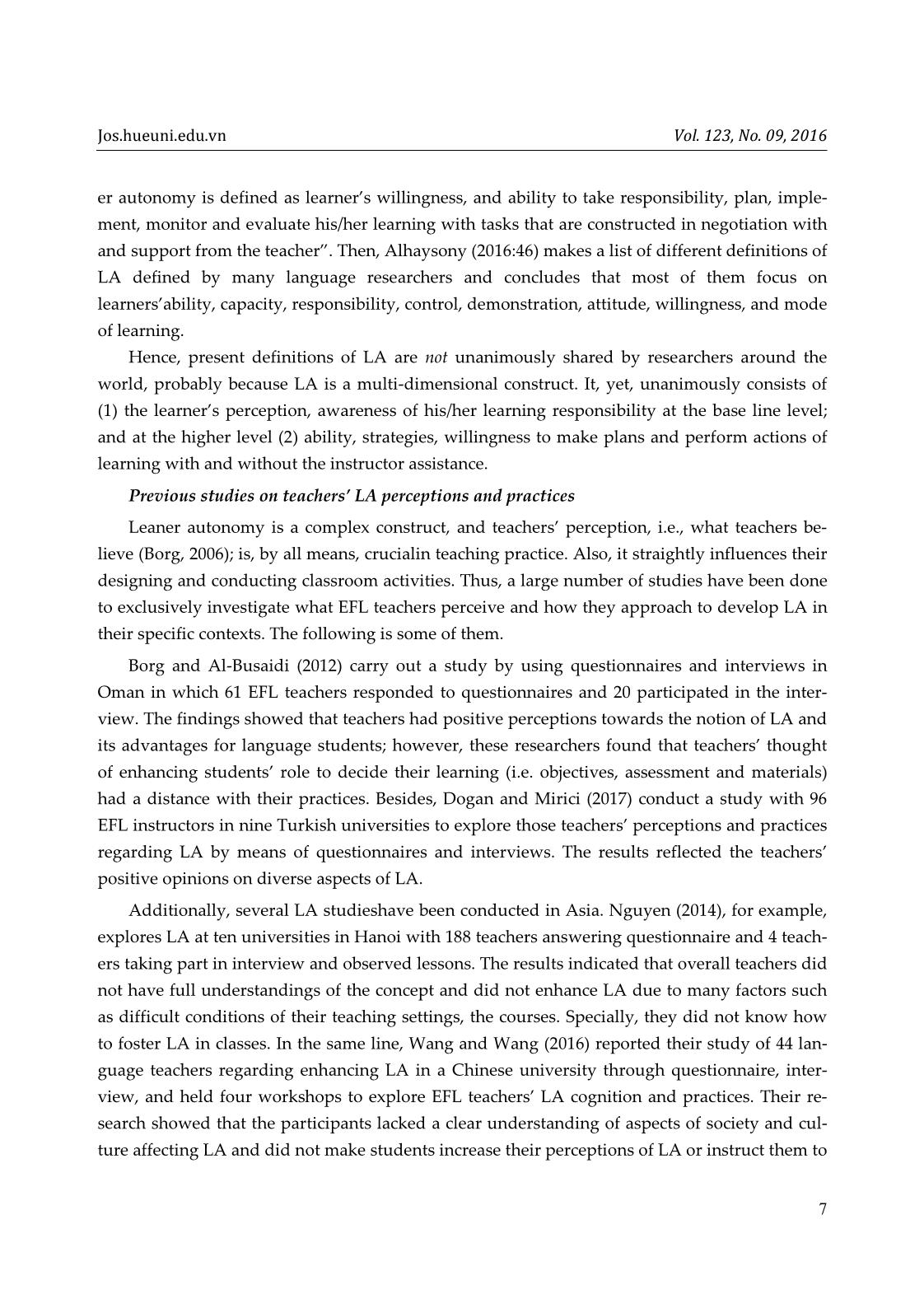
Trang 3
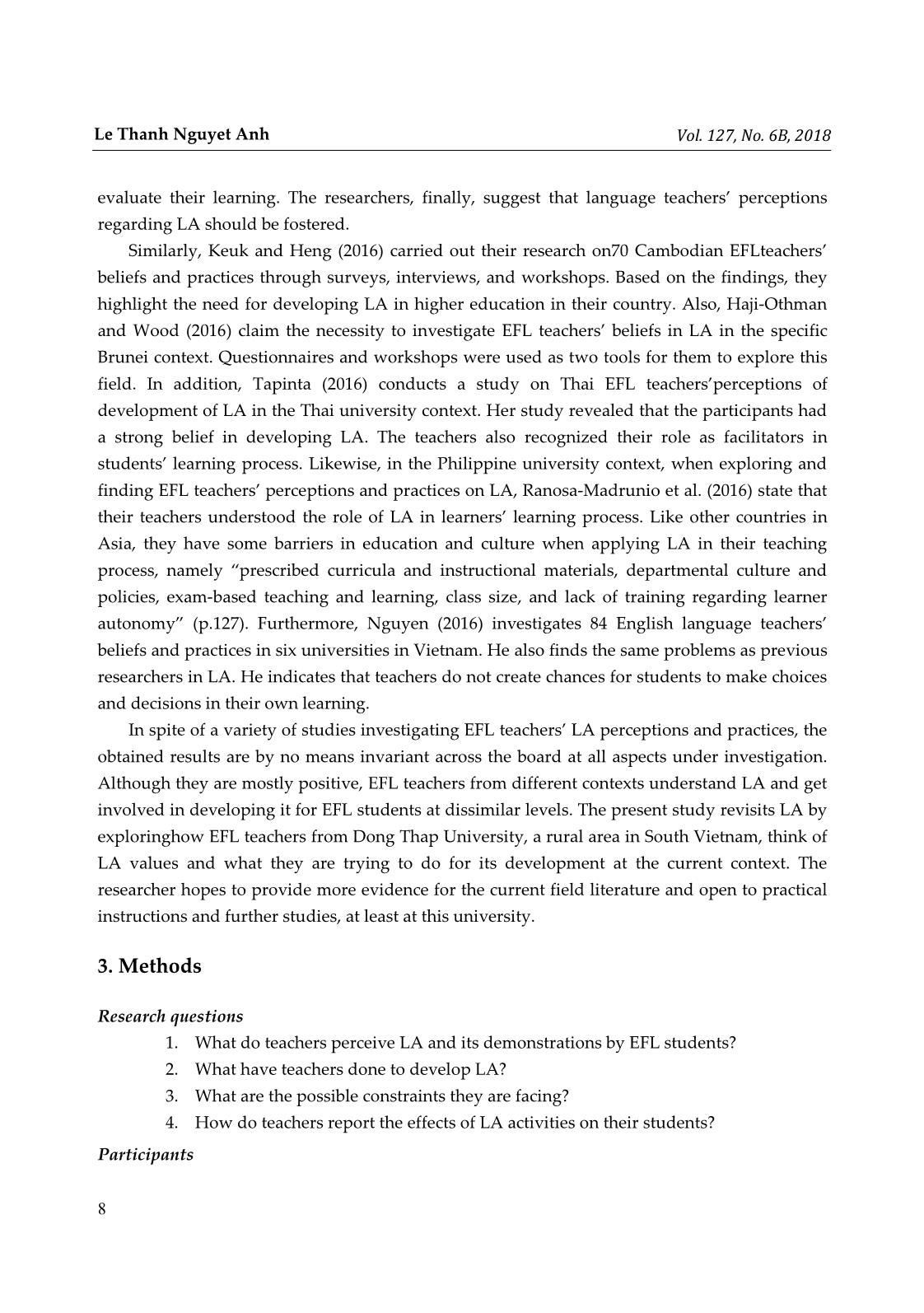
Trang 4
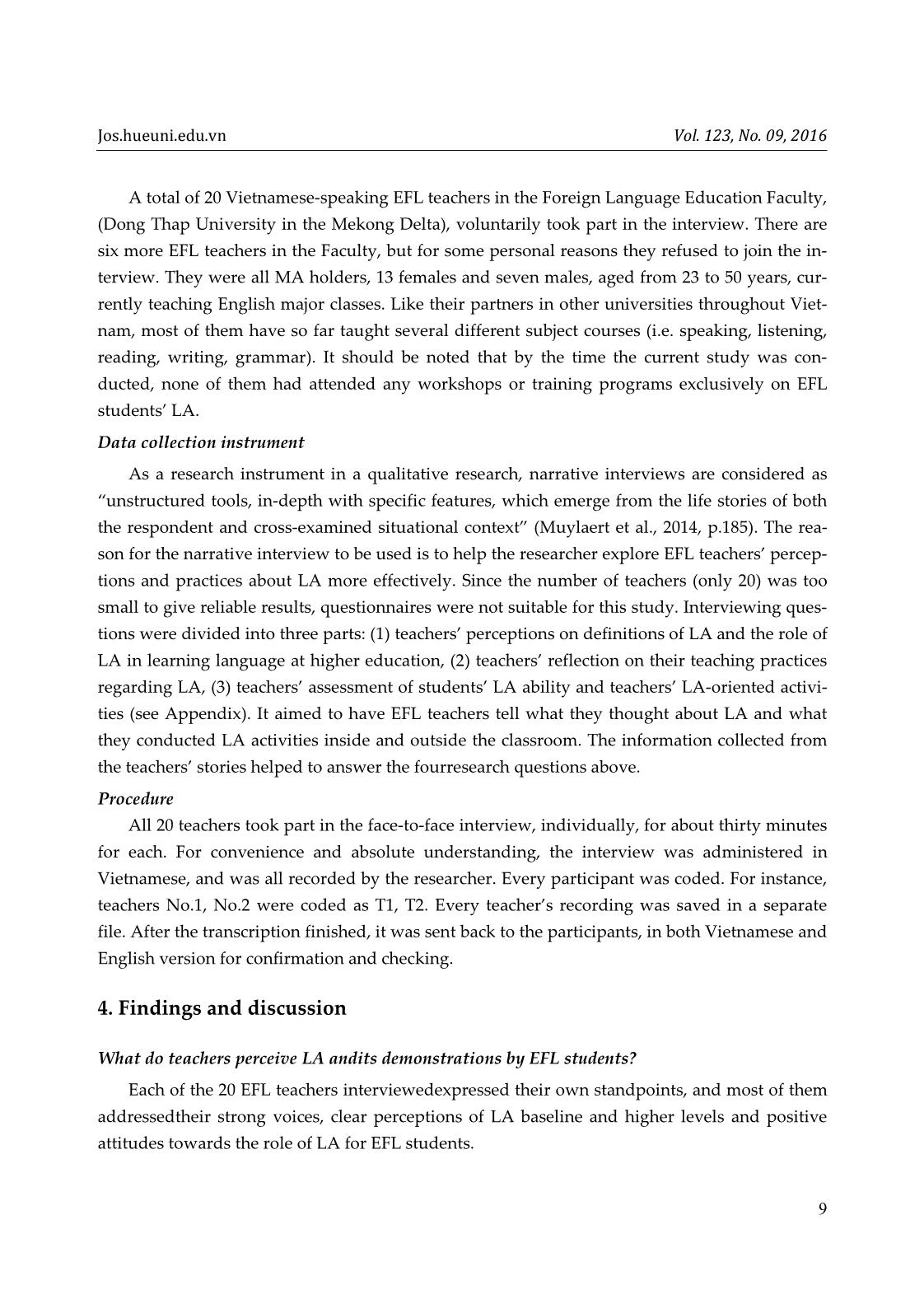
Trang 5
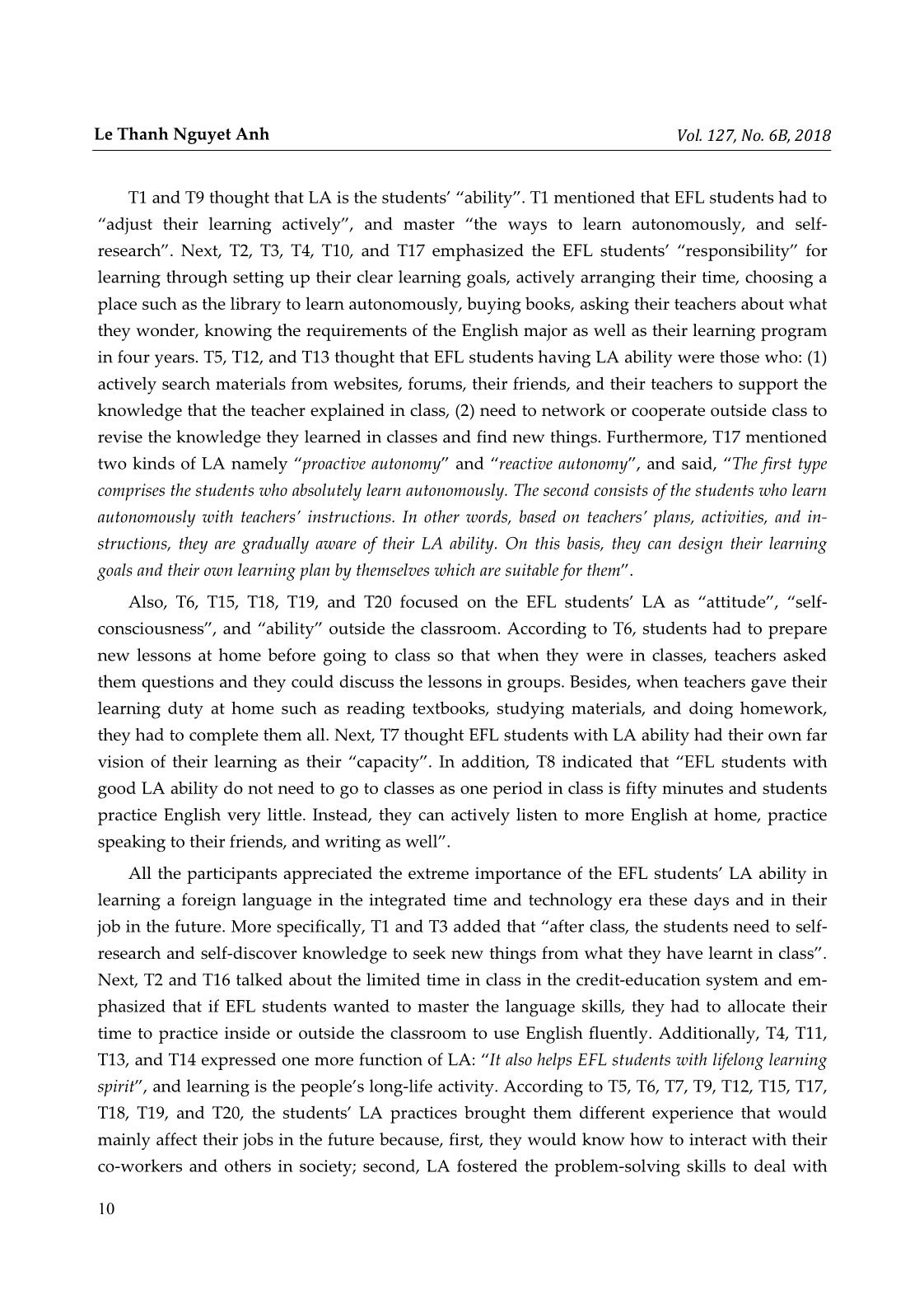
Trang 6
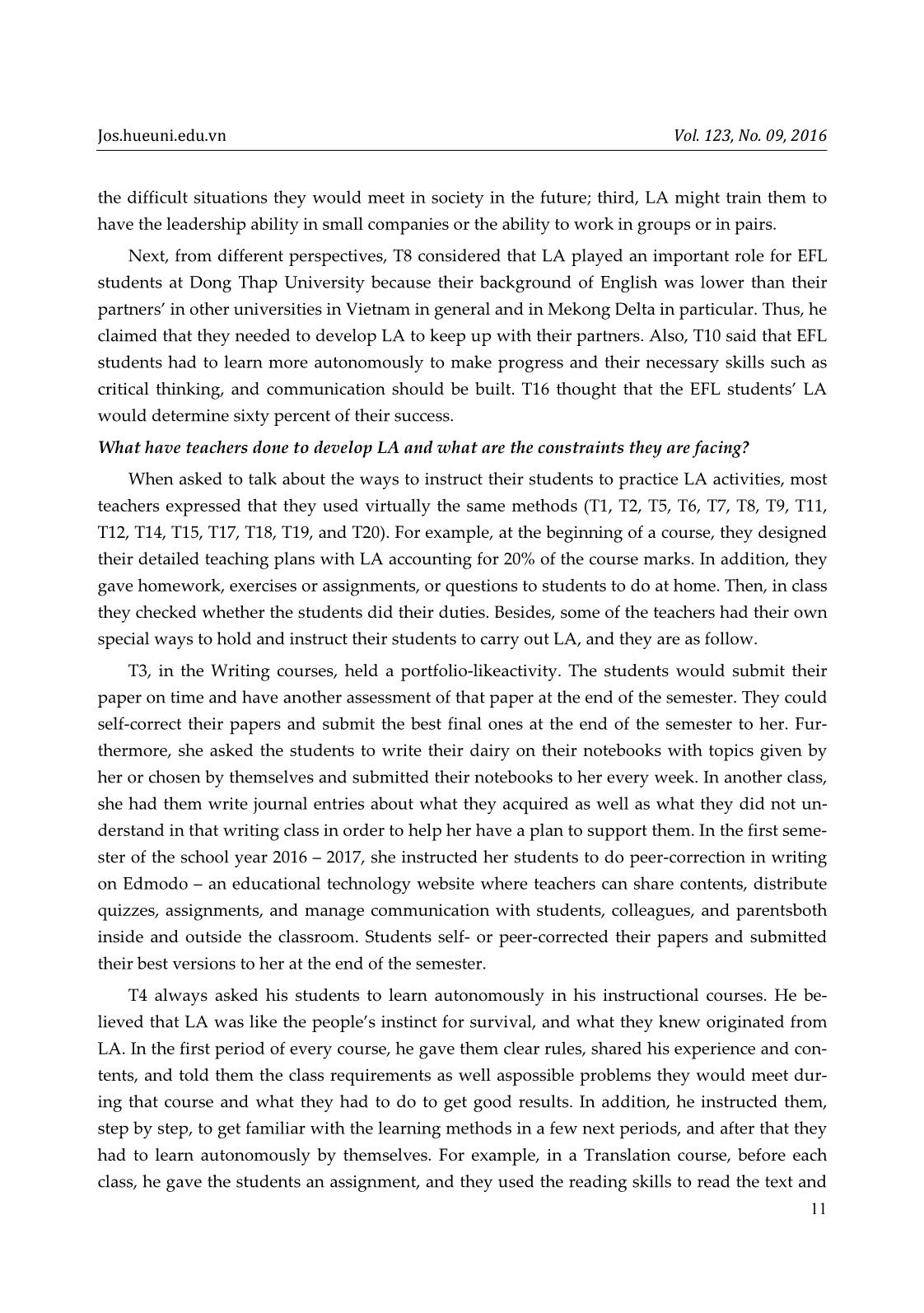
Trang 7
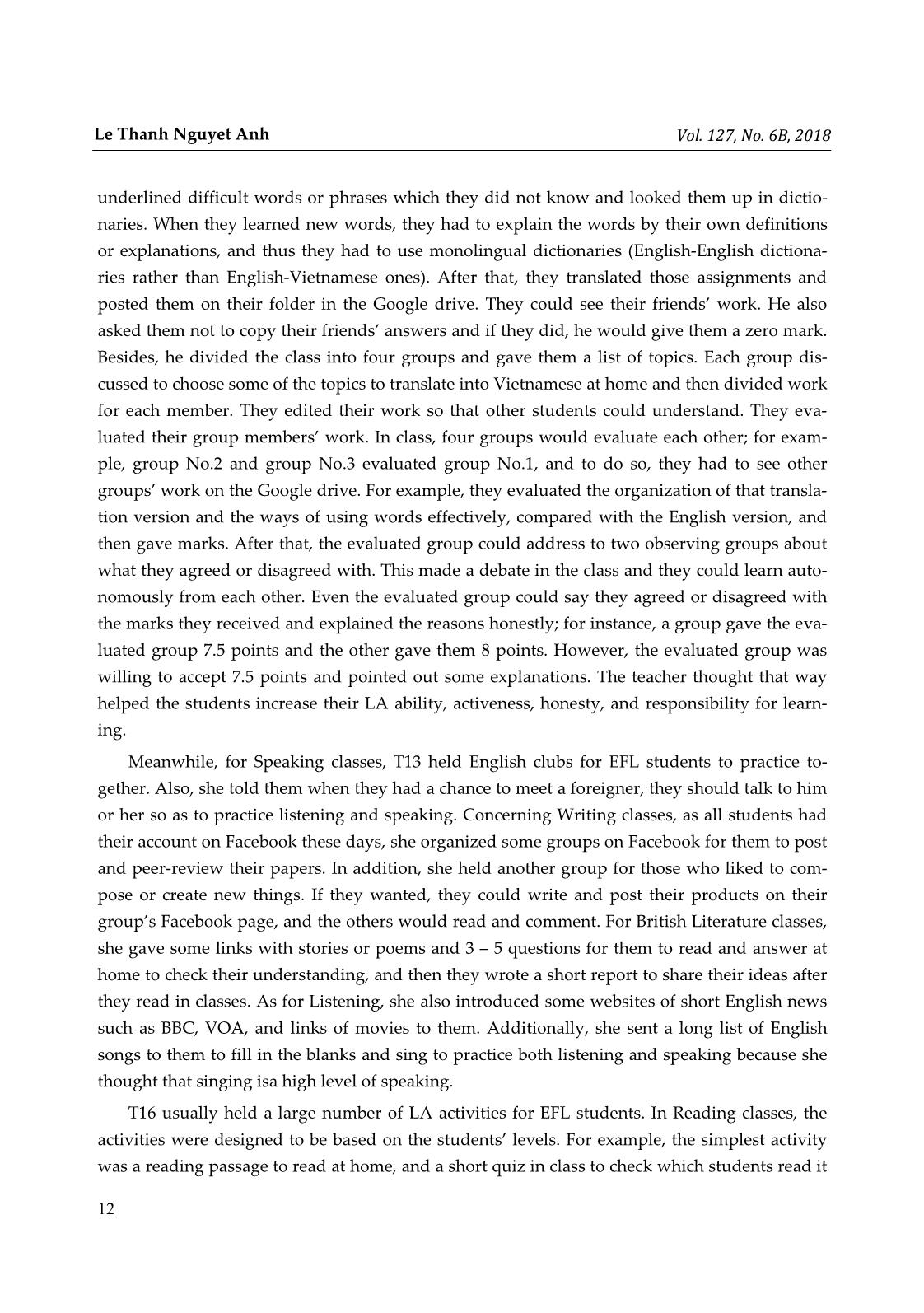
Trang 8
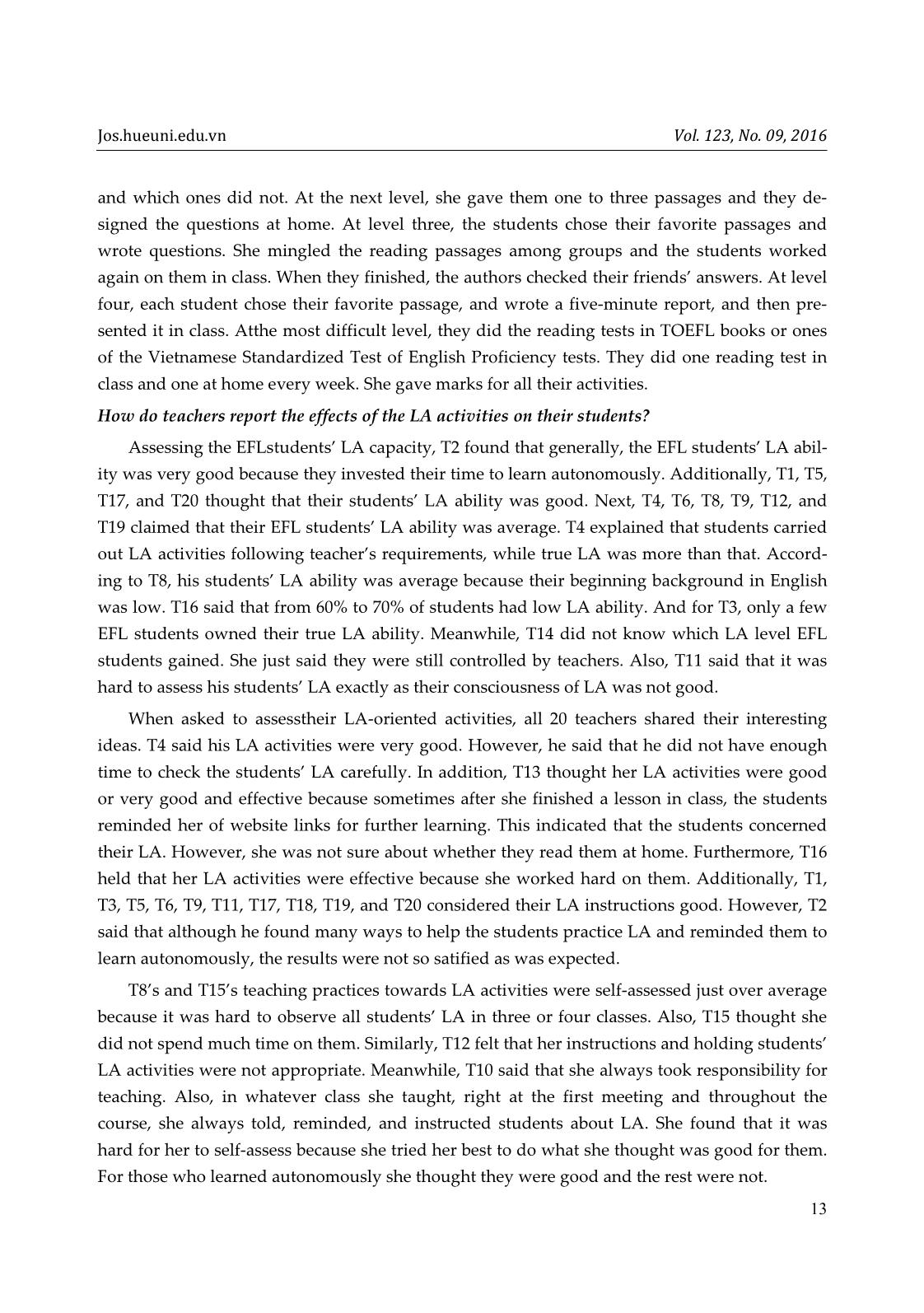
Trang 9
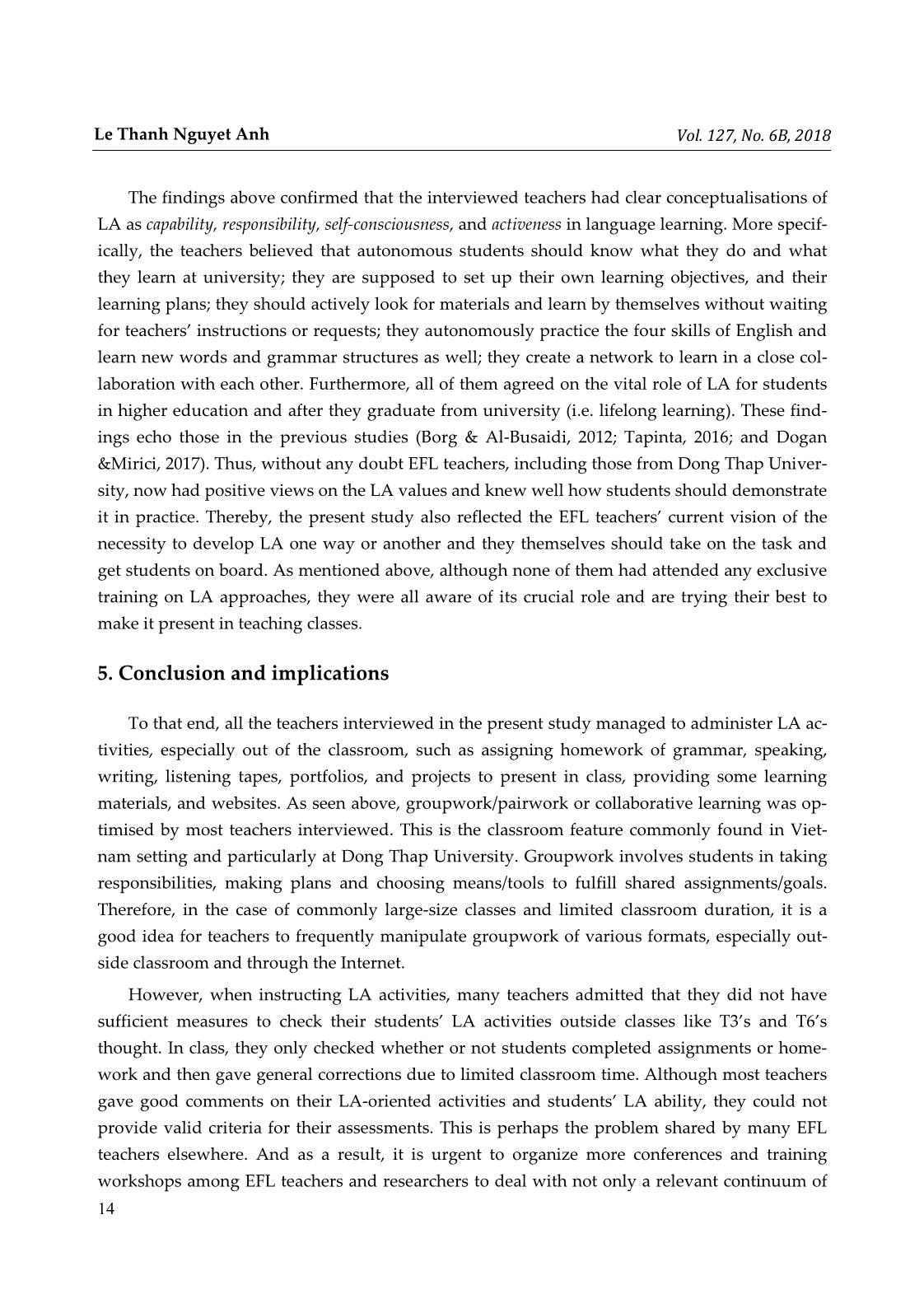
Trang 10
Tải về để xem bản đầy đủ
Tóm tắt nội dung tài liệu: EFL teachers’ perceptions and practices regarding learner autonomy at Dong Thap University, Vietnam
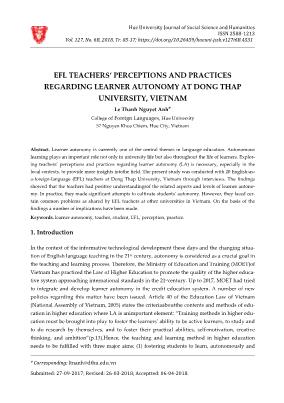
implest activity was a reading passage to read at home, and a short quiz in class to check which students read it Jos.hueuni.edu.vn Vol. 123, No. 09, 2016 13 and which ones did not. At the next level, she gave them one to three passages and they de- signed the questions at home. At level three, the students chose their favorite passages and wrote questions. She mingled the reading passages among groups and the students worked again on them in class. When they finished, the authors checked their friends’ answers. At level four, each student chose their favorite passage, and wrote a five-minute report, and then pre- sented it in class. Atthe most difficult level, they did the reading tests in TOEFL books or ones of the Vietnamese Standardized Test of English Proficiency tests. They did one reading test in class and one at home every week. She gave marks for all their activities. How do teachers report the effects of the LA activities on their students? Assessing the EFLstudents’ LA capacity, T2 found that generally, the EFL students’ LA abil- ity was very good because they invested their time to learn autonomously. Additionally, T1, T5, T17, and T20 thought that their students’ LA ability was good. Next, T4, T6, T8, T9, T12, and T19 claimed that their EFL students’ LA ability was average. T4 explained that students carried out LA activities following teacher’s requirements, while true LA was more than that. Accord- ing to T8, his students’ LA ability was average because their beginning background in English was low. T16 said that from 60% to 70% of students had low LA ability. And for T3, only a few EFL students owned their true LA ability. Meanwhile, T14 did not know which LA level EFL students gained. She just said they were still controlled by teachers. Also, T11 said that it was hard to assess his students’ LA exactly as their consciousness of LA was not good. When asked to assesstheir LA-oriented activities, all 20 teachers shared their interesting ideas. T4 said his LA activities were very good. However, he said that he did not have enough time to check the students’ LA carefully. In addition, T13 thought her LA activities were good or very good and effective because sometimes after she finished a lesson in class, the students reminded her of website links for further learning. This indicated that the students concerned their LA. However, she was not sure about whether they read them at home. Furthermore, T16 held that her LA activities were effective because she worked hard on them. Additionally, T1, T3, T5, T6, T9, T11, T17, T18, T19, and T20 considered their LA instructions good. However, T2 said that although he found many ways to help the students practice LA and reminded them to learn autonomously, the results were not so satified as was expected. T8’s and T15’s teaching practices towards LA activities were self-assessed just over average because it was hard to observe all students’ LA in three or four classes. Also, T15 thought she did not spend much time on them. Similarly, T12 felt that her instructions and holding students’ LA activities were not appropriate. Meanwhile, T10 said that she always took responsibility for teaching. Also, in whatever class she taught, right at the first meeting and throughout the course, she always told, reminded, and instructed students about LA. She found that it was hard for her to self-assess because she tried her best to do what she thought was good for them. For those who learned autonomously she thought they were good and the rest were not. Le Thanh Nguyet Anh Vol. 127, No. 6B, 2018 14 The findings above confirmed that the interviewed teachers had clear conceptualisations of LA as capability, responsibility, self-consciousness, and activeness in language learning. More specif- ically, the teachers believed that autonomous students should know what they do and what they learn at university; they are supposed to set up their own learning objectives, and their learning plans; they should actively look for materials and learn by themselves without waiting for teachers’ instructions or requests; they autonomously practice the four skills of English and learn new words and grammar structures as well; they create a network to learn in a close col- laboration with each other. Furthermore, all of them agreed on the vital role of LA for students in higher education and after they graduate from university (i.e. lifelong learning). These find- ings echo those in the previous studies (Borg & Al-Busaidi, 2012; Tapinta, 2016; and Dogan &Mirici, 2017). Thus, without any doubt EFL teachers, including those from Dong Thap Univer- sity, now had positive views on the LA values and knew well how students should demonstrate it in practice. Thereby, the present study also reflected the EFL teachers’ current vision of the necessity to develop LA one way or another and they themselves should take on the task and get students on board. As mentioned above, although none of them had attended any exclusive training on LA approaches, they were all aware of its crucial role and are trying their best to make it present in teaching classes. 5. Conclusion and implications To that end, all the teachers interviewed in the present study managed to administer LA ac- tivities, especially out of the classroom, such as assigning homework of grammar, speaking, writing, listening tapes, portfolios, and projects to present in class, providing some learning materials, and websites. As seen above, groupwork/pairwork or collaborative learning was op- timised by most teachers interviewed. This is the classroom feature commonly found in Viet- nam setting and particularly at Dong Thap University. Groupwork involves students in taking responsibilities, making plans and choosing means/tools to fulfill shared assignments/goals. Therefore, in the case of commonly large-size classes and limited classroom duration, it is a good idea for teachers to frequently manipulate groupwork of various formats, especially out- side classroom and through the Internet. However, when instructing LA activities, many teachers admitted that they did not have sufficient measures to check their students’ LA activities outside classes like T3’s and T6’s thought. In class, they only checked whether or not students completed assignments or home- work and then gave general corrections due to limited classroom time. Although most teachers gave good comments on their LA-oriented activities and students’ LA ability, they could not provide valid criteria for their assessments. This is perhaps the problem shared by many EFL teachers elsewhere. And as a result, it is urgent to organize more conferences and training workshops among EFL teachers and researchers to deal with not only a relevant continuum of Jos.hueuni.edu.vn Vol. 123, No. 09, 2016 15 LA-oriented activities (i.e., how to build up LA in students step by step), but also a shared framework of LA ability (i.e., at which level a student’s LA ability is, and what they should do next with reference to language proficiency levels). This LA framework should be easily used by both teachers and students for assessment and self-assessment. In other words, it should function as a working tool of LA, leading and adjusting them into the right tracks. Other problems in conductingLA activities include: Students being unprepared for LA development. They mainly went to class, listening, taking notes and waiting for exams. Teachers complained that when they asked students to learn au- tonomously they said they were very busy with frequent classes and extra-activities. Besides, in the evening they had to study second foreign languages such as Chinese or French, and Infor- matics at the Foreign Language Center of the university. Also, they were more attracted by many other things, especially Facebook, social websites, going out, playing games online, and so on. This indicates that students should be trained more with time management skills and it is the teachers who should give them useful guidelines of how to schedule work appropriately apart from regular class assignments. It also reveals that despite teachers’ significant efforts there is a gap between what teachers expect/desire from students and what they actually ob- serve in them. This problem has been reported in previous studies (e.g. Tapinta, 2016; Nguyen, 2016; Dogan & Mirici, 2017). Understandably, there is much for teachers to do for LA develop- ment, basically because LA is multi-dimensional and not all the students acquire it is a limited time. Large-size classes of mixed learning styles. Most teachers taught many large-sized classes each semester; thus, it is really hard for them to assess students’ LA activities outside as well as to give feedback about their homework or assignments inside classroom. Additionally, students have different learning styles, so teachers have to recommend/test out learning methods and ways to suit each student group of specific-learning styles. Large-sized classes are common throughout our country and this shortcoming cannot be solved in the near future. Thus, teach- ers should be aware of this and get prepared to design different activities for diverse learning styles, especially at beginning stages. Once students are on the right tracks, things will definite- ly become unproblematic. The present study has provided evidence about EFL teachers’ perceptions of LA principles in the Mekong Delta context. It strongly emphasizes teachers’ positive views towards the LA role for students’ college success and later life. Thus, within their ken, teachers are making sig- nificant attempts for its development in their teaching classes through regular course assign- ments, especially groupwork outside classroom. Due to large-sized classes of dissimilar learn- ing styles, class-time limitation, students’ passiveness, lack of motivation and involvement, they mostly fail to reap what they expect from their students. Le Thanh Nguyet Anh Vol. 127, No. 6B, 2018 16 References 1. Alhaysony, M. (2016). An Investigation of EFL teachers’ beliefs and practices of learner autonomy. International Journal on Studies in English Language and Literature, 4(12), 45-59. Retrieved from 22 June, 2017, 2. Borg, S. (2006). Teacher cognition and language education: research and practice. London: Continuum. 3. Borg, S. & Al-Busaidi, S. (2012). Learner autonomy: English language teacher’s beliefs and practices. British Council ELT research papers, 1 (pp. 213-244). London, England: British Council. 4. Doğan, G., & Mirici, İ. H. (2017). EFL instructors’ perception and practices on learner autonomy in some Turkish universities. Journal of Language and Linguistic Studies, 13(1), 166-193. 5. Haji-Othman, A. N., & Wood, K. (2016). Perceptions of learner autonomy in English language edu- cation in Brunei Darussalam. In R. Barnard & J. Li (Eds.), Language learner autonomy: Teachers beliefs and practices in Asian contexts (pp. 79-95). Cambodia: IDP Education (Cambodia) Ltd. 6. Holec, H. (1981). Autonomy and foreign language learning. Oxford: Pergamon Press. 7. Keuk, N. C., &Heng, V. (2016). Cambodian ELT Teachers’ beliefs and practices regarding language learner autonomy. In R. Barnard & J. Li (Eds.), Language learner autonomy: Teachers beliefs and practic- es in Asian contexts (pp. 62-78). Cambodia: IDP Education (Cambodia) Ltd. 8. Littlewood, W. (1999). Defining and developing autonomy in East Asian contexts. Applied Linguis- tics, 20(1), 71-94. 9. Muylaert, C. J., Junior., V. S., Gallo, P. R., Neto, M. L. R., Reis, A. O. A. (2014). Narrative interviews: an important source in qualitative research. In Rev Esc Enferm USP, 48(2), 184-189. Retrieved, July 30, 2016 from 10. National Assembly of Vietnam (2005). Vietnamese Education Law. Law number 38/2005/QH11, 14 June 2005 issued by National Assembly of Vietnam. 11. Nguyen, T. N. (2014). Learner autonomy in language learning: Teachers’ belief. Ph.D thesis, Queensland University of Technology. 12. Nguyen, V. L. (2016). Learner autonomy in Vietnam: Insights from English language teachers’ be- liefs and practices. In R. Barnard & J. Li (Eds.), Language learner autonomy: Teachers beliefs and practic- es in Asian contexts(pp.1-22). Cambodia: IDP Education (Cambodia) Ltd. 13. Ranosa-Madrunio, M., Tarrayo, N. V., Tupas, R., &Valdez, N. P. (2016). Learner autonomy: English language teachers’ beliefs and practices in the Philippines. In R. Barnard & J. Li (Eds.), Language learner autonomy: Teachers beliefs and practices in Asian contexts (pp. 114-133). Cambodia: IDP Educa- tion (Cambodia) Ltd. 14. Tapinta, P. (2016). Thai teachers’ beliefs in developing learner autonomy: L2 education in Thai uni- versities. In R. Barnard & J. Li (Eds.), Language learner autonomy: Teachers beliefs and practices in Asian contexts (pp. 96-113). Cambodia: IDP Education (Cambodia) Ltd. Jos.hueuni.edu.vn Vol. 123, No. 09, 2016 17 15. Wang, Y., & Wang, M. (2016). Developing learner autonomy: Chinese university EFL teachers’ per- ceptions and practices. In R. Barnard & J. Li (Eds.), Language learner autonomy: Teachers beliefs and practices in Asian contexts (pp. 23-42). Cambodia: IDP Education (Cambodia) Ltd. 16. Wenden, A. (1991). Learner strategies for learner autonomy. Englewood Cliffs, NJ: Prentice Hall. 17. Vietnamese Prime Minister (2012). Decision number 711/QD-TTg, 13 June 2012 issued by Prime Minister. Appendix Interviewing questions (for teachers) I. Teachers’ perceptions of definition, role, and demonstration of learner autonomy 1. How do you understand the term “learner autonomy” in case of EFL students? 2. What do you think about the role of learner autonomy to English majored students at Dong Thap University in the integrated time today and when they are employed to be teachers of English or officers in the future? II. Teachers’ teaching practices regarding learner autonomy 3. How long have you taught English? Which majors subjects do you often teach? Have you ever im- plemented autonomously learning activities for your EFL students? If yes, what LA activities have you ever organized in each English subject in details? Inside or outside classroom? How often? 4. How can you check or evaluate whether your students have carried out those or not? 5. Which advantages and disadvantages do you meet when organizing autonomously learning activi- ties for your EFL students? III. Teachers’ assessment of their LA activities 6. You evaluate which level of LA ability EFL students at Dong Thap University get: poor, average, good, or excellent? Why? 7. How do you self-assess your instruction of LA activities for EFL students?
File đính kèm:
 efl_teachers_perceptions_and_practices_regarding_learner_aut.pdf
efl_teachers_perceptions_and_practices_regarding_learner_aut.pdf

